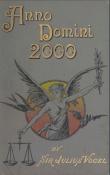AustLit
Latest Issues
AbstractHistoryArchive Description
Published in 1889, and regarded as New Zealand's first science fiction novel, Anno Domini 2000 has been described as a surrealistic political melodrama with a plot that revolves around, love, desire and dynastics (Bleiler p. 779). Anticipating a utopian future where women around the world, including the British Empire and the United States of America, hold many positions of authority, the story is mostly set in New Zealand and Australia, with some events scattered elsewhere.
The central character is Hilda Richmond Fitzherbert, a young New Zealand woman who works as a sub-secretary to one of the ministers. Lord Reginald Parramatta, a villainous Australian republican, has his eyes set on the abduction and wooing of Miss Fitzherbert. Opposed to him is Colonel Laurent, head of the secret police, who is also in love with the beautiful sub-secretary. Lord Parramatta attempts to abduct Hilda on several occasions but is foiled each time. When Hilda and the young Emperor Albert fall in love and Parramatta is publicly rejected he plots to take Australia out of the Empire. The romance between Albert and Hilda also creates an international crisis, too, as Albert is forced to refuse the hand of the female US President's daughter. This which precipitates an Anglo-American war, which the Empire wins, and which further leads to the dissolution of the United States and its reabsorption into the Empire. Several years later, the Emperor and his Empress find that their opinions about male primacy in royal succession have reversed themselves, when faced with a brilliantly competent princess and bookish, scholarly prince as prospective heirs apparent to the throne.
Vogel devotes lengthy sections of the book towards detailing the intricacies of finance and federal Imperial politics of the future - which in this instance sees the needs of the people largely eliminated 'through the benevolence of the wealthy and governmental aid finances through stiff inheritance and income taxes' (Bleiler, p.779). While the novel did not initially attract widespread interest, it has since received recognition for its uncanny representation of New Zealand's female-dominated political, judicial and corporate executive hierarchies. One of the primary technological devices used within the story is magnetism - which provides the use the ability to paralyse people (including groups of people) through the use of magnetic force.
Notes
Publication Details of Only Known VersionEarliest 2 Known Versions of
Works about this Work
- Forecasts of the Future in Modern Literature single work criticism
-
A Feminist, Imperialist Utopia: Sir Julius Vogel and Anno Domini 2000
2022
single work
essay
— Appears in: Meanjin , June vol. 81 no. 2 2022; (p. 176-182) Meanjin Online 2022; 'Utopias are neither as popular nor as frequent as their dark mirror, dystopias. Projecting from today into the future, using the thought experiment of extrapolation '(if this goes on...)' tends to produce more pessimism than optimism. That is hardly surprising in our perennially anxious times. Nor are vintage utopias palatable to a modern audience: they can contain racism, eugenics, or happily exterminate most of the biosphere (as in Joseph Fraser's 1889 'Melbourne and Mars: My Mysterious Life on Two Planets'). What can seem perfection then can read like tedious hell now. Additionally, utopias are not easy to write well, as polemical perfection lacks conflict, tension, the inherent interest of the devil's party. Some have endured, like Plato's Republic, but it is certainly less read than 'The Handmaid's Tale' or 1984.' (Publication abstract) -
National Pasts and Imperial Futures : Temporality, Economics, and Empire in William Morris's 'News from Nowhere' (1890) and Julius Vogel's 'Anno Domino 2000' (1889)
2008
single work
criticism
— Appears in: Utopian Studies , vol. 19 no. 1 2008; (p. 49-72) -
'Anno Domini 2000; Or, Women's Rights'
1990
single work
review
— Appears in: Science-Fiction : The Early Years 1990; (p. 779)
— Review of Anno Domini 2000, Or, Woman's Destiny 1889 single work novel
-
'Anno Domini 2000; Or, Women's Rights'
1990
single work
review
— Appears in: Science-Fiction : The Early Years 1990; (p. 779)
— Review of Anno Domini 2000, Or, Woman's Destiny 1889 single work novel - Forecasts of the Future in Modern Literature single work criticism
-
National Pasts and Imperial Futures : Temporality, Economics, and Empire in William Morris's 'News from Nowhere' (1890) and Julius Vogel's 'Anno Domino 2000' (1889)
2008
single work
criticism
— Appears in: Utopian Studies , vol. 19 no. 1 2008; (p. 49-72) -
A Feminist, Imperialist Utopia: Sir Julius Vogel and Anno Domini 2000
2022
single work
essay
— Appears in: Meanjin , June vol. 81 no. 2 2022; (p. 176-182) Meanjin Online 2022; 'Utopias are neither as popular nor as frequent as their dark mirror, dystopias. Projecting from today into the future, using the thought experiment of extrapolation '(if this goes on...)' tends to produce more pessimism than optimism. That is hardly surprising in our perennially anxious times. Nor are vintage utopias palatable to a modern audience: they can contain racism, eugenics, or happily exterminate most of the biosphere (as in Joseph Fraser's 1889 'Melbourne and Mars: My Mysterious Life on Two Planets'). What can seem perfection then can read like tedious hell now. Additionally, utopias are not easy to write well, as polemical perfection lacks conflict, tension, the inherent interest of the devil's party. Some have endured, like Plato's Republic, but it is certainly less read than 'The Handmaid's Tale' or 1984.' (Publication abstract)
- Melbourne, Victoria,
-
cCanada,cAmericas,
-
cUnited States of America (USA),cAmericas,
- 2000







